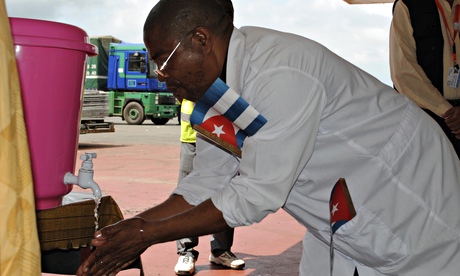
The international response to the Ebola epidemic in west Africa is too slow and providing too few beds for the sick to stop the soaring number of cases and deaths, scientists say.
A paper in the Lancet Infectious Diseases medical journal models the response in Montserrado, Liberia, against the spread of the virus and warns that current efforts will not bring the outbreak under control.
“Our predictions highlight the rapidly closing window of opportunity for controlling the outbreak, and averting a catastrophic toll of new Ebola cases and deaths in the coming months,” warns Alison Galvani, senior author and professor of epidemiology at Yale School of Public Health.
In their paper, she and colleagues say: “Although we might still be within the midst of what will ultimately be viewed as the early phase of the current Ebola virus disease outbreak, the window of opportunity for aversion of calamitous repercussions from an initially delayed and insufficient response is diminishing rapidly. Our predictions suggest that current commitments are grossly inadequate to provide beds for all affected individuals, even only considering near-term growth of the epidemic in Montserrado.”
The Yale scientists find that if nothing more is done, there will be more than 170,000 Ebola cases – including those that are unreported – and more than 90,000 deaths by 15 December in Montserrado, a densely populated county containing the capital, Monrovia, and which has one of the highest case rates in Liberia.
If there is a rapid growth in provision by 31 October, including 4,800 beds and a five-fold increase in the speed of case detection, and if protective kits are allocated to families forced to nurse patients at home for want of a bed, nearly 98,000 of those cases could be prevented, they say. But if the response is delayed to 15 November, only about 54,000, would be prevented.
But 4,800 beds is more than are currently planned. The US, which is leading the response in Liberia, has promised 17 new treatment centres with beds for 1,700 patients in Montserrado. As of 15 October, Liberia, according to the World Health Organisation, had 620 Ebola beds, 21% of the planned total of 2,930 for the country.
“Findings of our analysis suggest that the capacity of Ebola virus disease treatment centres needed to reduce the severity of the current outbreak greatly exceeds current international commitments,” the authors write.
Other scientists questioned whether it was possible to model the progression of a fast-moving epidemic in the way the Yale authors have and Neil Ferguson, professor of mathematical biology at Imperial College London, said the number of new cases had already plateaued in the area. “It’s too early to say whether the ongoing and intense control efforts in Monrovia have yet achieved control or merely slowed the epidemic, but what is being seen on the ground is clearly incompatible with the results in this paper,” he said.
But others said the predictions were valid and useful. “There are so many unknowns in this current outbreak, especially the true number of infected individuals, but despite the uncertainties, this work generates a roadmap highlighting the most effective methods of containment and the impacts of past and future delays on our ability to stop this outbreak,” said Jonathan Ball, professor of molecular virology at the University of Nottingham.
Meanwhile, a meeting of the WHO’s emergency committee has urged countries unaffected by Ebola not to introduce travel bans to and from Sierra Leone, Liberia and Guinea, which may lead to more people attempting to leave the epidemic countries. “A general travel ban is likely to cause economic hardship, and could consequently increase the uncontrolled migration of people from affected countries, raising the risk of international spread of Ebola,” it said in a statement.
It urged the normalisation of air and sea traffic, to reduce the economic damage the region is suffering.
